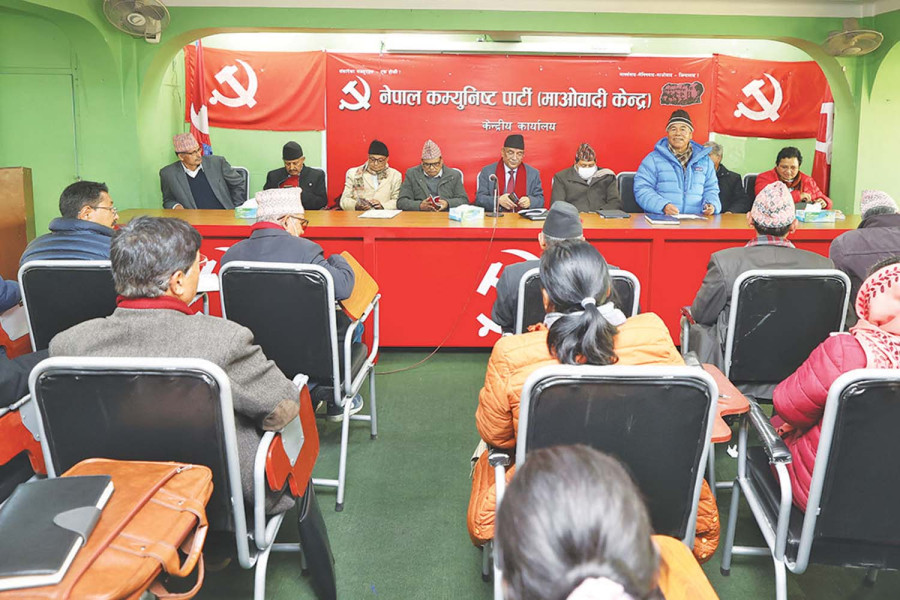Politics
Maoists discuss consensus President
Leaders for pursuing the strategy without harming relations with ruling partner UML.
Tika R Pradhan
The ruling CPN (Maoist Centre) has started discussions on the hotly debated upcoming presidential election at its Standing Committee meeting that kicked off Thursday.
Discussions on the President have begun as the country is waiting for a decision from the Maoist Centre, whose role will be crucial in electing a new President.
Although the Maoist Centre had reportedly agreed to cede the presidency to a UML nominee in exchange for the latter’s backing for Pushpa Kamal Dahal’s prime ministerial bid, Dahal publicly disowned such agreement saying the political situation has changed after the largest party in Parliament, the Congress, gave him trust vote. Dahal also hinted at backing a consensus candidate for the top job.
During a floor test in Parliament on January 10, Congress chief and former prime minister Sher Bahadur Deuba had decided to give a vote of confidence to Dahal by ignoring dissident voices in the grand old party.
The two Congress general secretaries Gagan Thapa and Bishwa Prakash Sharma; Vice-president Dhan Raj Gurung; and senior leader Shekhar Koirala, among other influential leaders, were initially against Deuba’s proposal to support the Dahal government.
Leaders close to Deuba, however, argue that they supported the Dahal government expecting Maoist support for a Congress candidate for President.
Following the trust vote, Dahal publicly said that in return for the Congress vote, he would try his best to accommodate the largest party’s aspirations in the election for the head of state.
The Standing Committee meeting of the Maoist Centre that started Thursday at party headquarters in Parisdanda, has started a discussion on different issues, with the presidential election on top of the agenda.
Prime minister and party chair Dahal, while briefing the meeting on the current political situation, defended his decision to quit the Congress-led pre-election alliance and join hands with the UML.
Following the meeting, party secretary Devendra Poudel said the Maoist Centre would focus on achieving a national consensus among parties to ensure the current parliament lasts its full term as well as on safeguarding the constitution.
“We discussed why the President, who is the protector of the constitution and the country’s guardian, should be picked through national consensus,” Poudel said after the meeting. “Congress also gave a confidence vote to the prime minister, which in turn created a new dynamic. So we want national consensus on the President. But it doesn’t mean we break ties with the UML.”
The Maoist chairman’s arch-rival until a few months ago, UML chief Oli had come to Dahal’s rescue after Congress President Deuba refused to cede premiership to Dahal.
“We want to find a figure like Abdul Kalam [the 11th President of India] for the new President, someone who is universally respected,” said Poudel. “At the same time, we are mindful of our partnership with the UML.”
UML chair Oli has already told top leaders of major parties that they should forge consensus on a UML candidate for President.
Dev Prasad Gurung, general secretary of the Maoist Center, said the party chair presented his political proposal along with the briefings of latest developments and the Standing Committee members will offer their views on different issues starting Monday including the presidential election.
According to Maoist leaders, Dahal told the Standing Committee that he has been vigorously discussing the presidential election with UML chair Oli as well as with all other parties in the ruling coalition, especially in the changed context of the Congress backing the government.
On Thursday too Oli went to Baluwatar to discuss with the prime minister various issues including the presidential election.
“The prime minister wants national consensus on constitutional positions including the President,” said Haribol Gajurel, chief advisor to the prime minister. “But he is still committed to the current ruling coalition.”




 8.43°C Kathmandu
8.43°C Kathmandu















